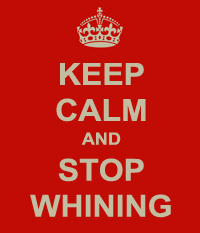 While complaining may provide us an opportunity to “unload,” and even help us feel connected to one another as we share our grievances, excessive complaining can create an internal cycle of negativity and become a heavy burden to those close to us. By challenging thoughts and feelings that are attached to maladaptive behaviors, we work to transform these habits (such as excessive complaining) into positive actions that serve us better in the long run.
While complaining may provide us an opportunity to “unload,” and even help us feel connected to one another as we share our grievances, excessive complaining can create an internal cycle of negativity and become a heavy burden to those close to us. By challenging thoughts and feelings that are attached to maladaptive behaviors, we work to transform these habits (such as excessive complaining) into positive actions that serve us better in the long run.
In a recent Psychology Today article, NYC psychologist Vivian Diller proposes five steps to “un-whine.” To demonstrate how this works, she applies the steps to a common complaint, like “my aching shoulder.”
* * *
Identify the discomfort
I just played tennis and developed a pain in my shoulder that I’ve not had before. I take a moment to pay attention to what I feel, thinking “my shoulder is killing me.” I listen to the complaint in my head with the kind of concern I would if I heard a close friend was hurt. I say to myself empathically, “It’s understandable that I’m bothered by this ache, what a bummer.” While I may give myself the chance to feel “ow” and think “this really hurts,” I quickly move on toward, “Now what?”
Be proactive
My next thought is, “Is there anything I can do immediately to relieve my discomfort?” Regarding my shoulder — I can ice it, take two Advil and make an appointment for physical therapy. Often there is some immediate action we can take that responds directly to a complaint. This doesn’t only apply to physical aches and pains, but emotional and interpersonal ones as well. (For example if I had a disagreement with a friend, I might consider phoning him to resolve it rather than simply voicing my irritation to someone else.) A productive action makes us feel like we are taking charge of our discomforts rather than being passively victimized by them.
Tolerate frustration
A certain amount of physical or psychological pain is often more tolerable than we think. Of course it depends on the severity of the problem, but many discomforts gradually diminish or disappear over time. Telling myself “My shoulder is bothering me, but it’s very likely that it will get better,” is more helpful than focusing on the pain. It’s not about simply gritting my teeth and bearing the pain. On the contrary, it’s about taking time to think about solutions (or if necessary, eliciting help from others) rather than voicing discomforts out of habit.
Shift expectations
Life is a series of adjustments. Sooner or later, we will all experience physical and cognitive changes that come with age. Some confront these losses earlier, some more dramatically than others. We all must adjust our expectations if we are to avoid feeling chronically disappointed. If my shoulder hurts, I think, “Maybe I overused it?” Or “Perhaps I’m not as strong as I once was.” I consider the possibility that I may have to take a break from tennis or play doubles instead of singles to avoid stressing my shoulder. Unless we balance the desire to maintain vitality with accepting increasing limitations, we will lose our battle with the aging process.
Make long-term change
Some discomforts require a broader, longer view on life. It may mean shifts in our environment, relationships or lifestyle. If my shoulder can’t tolerate the repeated motion required to play tennis, perhaps I have to use less topspin, serve underhand or even begin thinking of an alternative sport. If I’m unwilling to consider taking the long-range perspective, I’ll put myself in the position of feeling chronic pain. Changing my outlook on the sport I love will lead to changes in my behavior that will likely result in fewer complaints.
* * *
Chronic complaining is a learned habit, says Diller, and unlearning it takes practice. In addition, if we begin to understand that consistent satisfaction and comfort is an unrealistic goal, perpetuated by a culture that promotes non-stop happiness, we can learn to tolerate some frustration in life and, at the same time, start to “un-whine.”